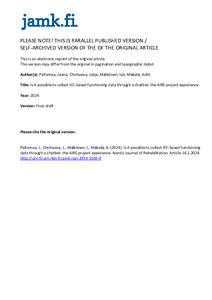Is it possible to collect ICF-based functioning data through a chatbot: the AIRE project experience
Paltamaa, Jaana; Chichaeva, Julija; Mälkönen, Ida; Mäkelä, Antti (2024)
Paltamaa, Jaana
Chichaeva, Julija
Mälkönen, Ida
Mäkelä, Antti
Jyväskylän ammattikorkeakoulu
2024
All rights reserved. This publication is copyrighted. You may download, display and print it for Your own personal use. Commercial use is prohibited.
Julkaisun pysyvä osoite on
https://urn.fi/URN:NBN:fi-fe2024040414746
https://urn.fi/URN:NBN:fi-fe2024040414746
Tiivistelmä
The COVID-19 pandemic showed that the current rehabilitation system needs to evolve towards a
more digital environment. Our aim in the AIRE project (https://www.jamk.fi/fi/projekti/aire) was to
develop and pilot a digital rehabilitation platform and operating model based on conversational AI,
and to promote digital leap in the rehabilitation sector. The overall aim of this use case was to
model how to collect ICF-based functioning data using conversational artificial intelligence. The
related possibilities are discussed in this article. An ASIA-chatbot based on open-source
conversational assistant RASA was developed and piloted. The use case consists of a total of 177
different end-user expressions related to neck and shoulder issues. The inputs of the end-user’s
natural language expressions were collected into the intent library. Those intents that were
identified as part of functioning were linked to the ICF. This paper presents the procedure and
discusses its potential use in rehabilitation. This use case showed that ICF-based functioning data
can be collected using conversational AI, but there are still several challenges to its systemic use.
For example, how to make buttons in the conversation to be beneficial in ICF-based information
collection. The feasibility, acceptability, safety, and effectiveness of various conversational AI
formats should also be assessed. The use of the ICF for automated assessment and monitoring of
functioning could in the future provide a description of functioning for informed decision-making
to optimise the rehabilitation of people with chronic diseases. This paper discusses new application
possibilities for digital rehabilitation, ICF and conversational AI.
more digital environment. Our aim in the AIRE project (https://www.jamk.fi/fi/projekti/aire) was to
develop and pilot a digital rehabilitation platform and operating model based on conversational AI,
and to promote digital leap in the rehabilitation sector. The overall aim of this use case was to
model how to collect ICF-based functioning data using conversational artificial intelligence. The
related possibilities are discussed in this article. An ASIA-chatbot based on open-source
conversational assistant RASA was developed and piloted. The use case consists of a total of 177
different end-user expressions related to neck and shoulder issues. The inputs of the end-user’s
natural language expressions were collected into the intent library. Those intents that were
identified as part of functioning were linked to the ICF. This paper presents the procedure and
discusses its potential use in rehabilitation. This use case showed that ICF-based functioning data
can be collected using conversational AI, but there are still several challenges to its systemic use.
For example, how to make buttons in the conversation to be beneficial in ICF-based information
collection. The feasibility, acceptability, safety, and effectiveness of various conversational AI
formats should also be assessed. The use of the ICF for automated assessment and monitoring of
functioning could in the future provide a description of functioning for informed decision-making
to optimise the rehabilitation of people with chronic diseases. This paper discusses new application
possibilities for digital rehabilitation, ICF and conversational AI.
